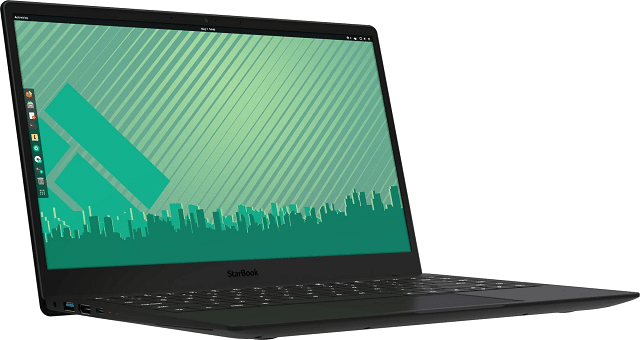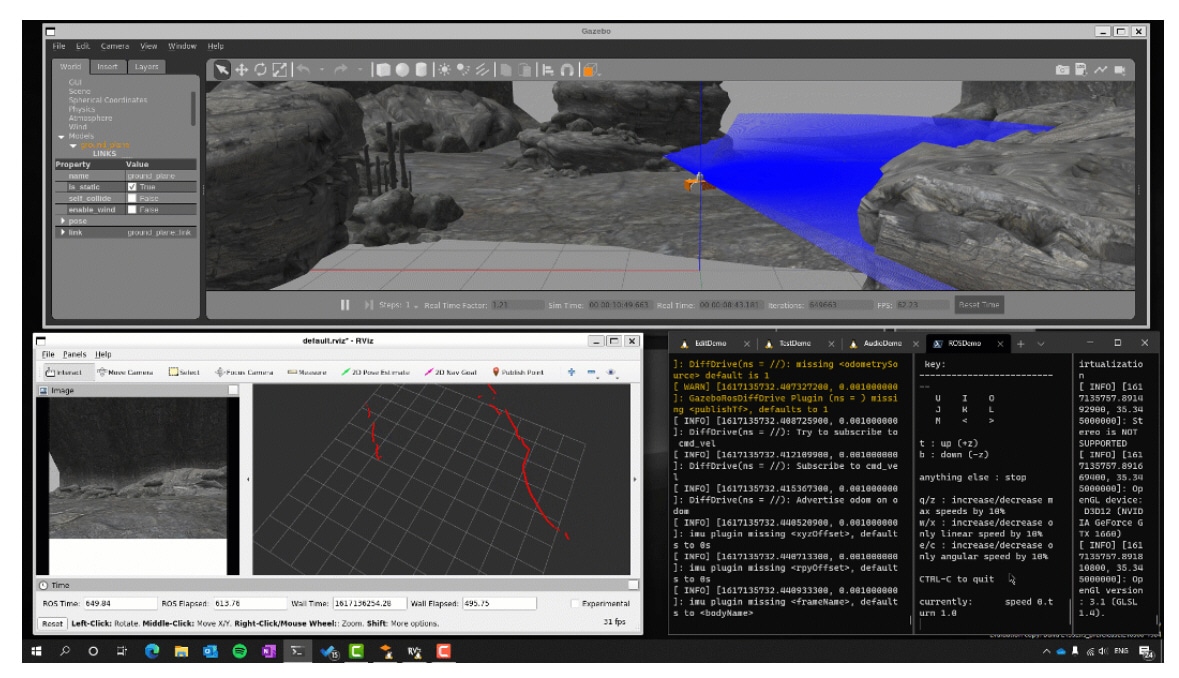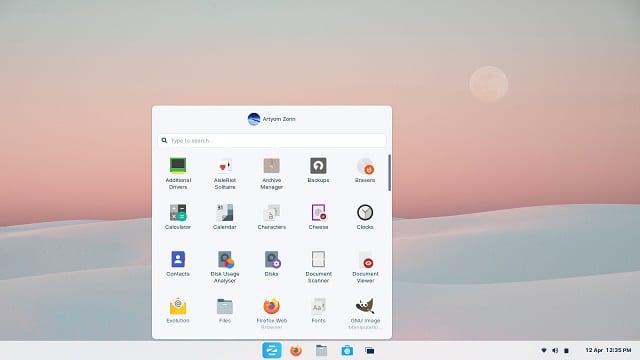
System76 begins shipping Linux computers to Mexico, including ones made in the USA
When you live in the USA, you get used to buying things that are made in other countries. It is just very common to see things stamped with "Made in China" or "Made in Mexico." Some Americans take issue with this, actively trying to buy products made in the USA, but this can be quite hard. Even American car companies, like Ford, outsource labor to foreign counties, such as Mexico.
System76 is a company that sells computers preloaded with Linux-based operating systems, including laptops and desktops. While its laptops are not yet manufactured in the USA, its beautiful Thelio desktops are handcrafted here. And now, in an interesting twist, System76 has begun shipping its computers to customers in Mexico.

Star Labs StarBook Mk V laptop for sale with Linux Mint, Ubuntu, Manjaro, and more
Back in the day, getting a laptop with Linux pre-installed was almost unheard of. For the most part, you had to buy a computer with Windows and then install Linux yourself. This wasn't bad necessarily, but it did mean that the price of the computer usually included a Windows license you maybe didn't want. In other words, Microsoft was profiting off of Linux users -- just because the consumer bought a Windows PC.
In 2021, however, there are many computers to be had with Linux pre-installed -- thanks to pioneers like System76. Of course, nowadays, big companies like Dell and Lenovo are selling Linux machines too. Today, yet another such laptop hits the market -- the Star Labs StarBook Mk V. This 14-inch notebook can be had your choice of several quality Linux distributions pre-installed, such as Linux Mint, Ubuntu, and Manjaro to name a few. And yes, Windows 10 is an option too.

Microsoft Edge Chromium-based web browser for Linux achieves Beta status
When Microsoft first announced it was bringing Edge to Linux, I was less than enthusiastic about it. In fact, I declared that I would never install the web browser on my own Linux computer. To this day, I have yet to install Edge for Linux, although my stance is softening a bit. Mozilla Firefox is feeling stagnant, while I am troubled by the FLoC situation with Google Chrome. Could Microsoft Edge for Linux be in my future?
Well, Microsoft's web browser just got one step closer to a stable release, so I might have to give it a try. You see, as of today, Edge has achieved Beta status! This means its development has progressed quite swimmingly, and the Chromium-based web browser should be totally fine to use daily. And yes, you can install Edge Beta for Linux right now.

Microsoft is working towards running Linux as ARM64 Hyper-V guest
Microsoft's love affair with Linux has been developing in recent years, and has now reached the stage of being a serious relationship. Such is Microsoft's commitment that the company is now actively involved in contributing to the Linux kernel.
One of the latest updates sees the company shifting its focus slightly when it comes to Hyper-V. Its virtualization tool has thus far been largely fixated with x86_64, but now there is a move towards "running Linux as ARM64 Hyper-V guest".

You can download Ubuntu Linux 21.10 'Impish Indri' daily builds right now!
Ubuntu 21.10 won't get a stable release until October of 2021. In fact, we know the exact date the Linux-based operating system should be made available -- October 14. In addition to that date, we also know what the distribution's codename is -- Impish Indri.
Unfortunately, we only just entered the month of May, meaning Ubuntu 21.10 won't be available to download -- in stable form, at least -- for about five more months. According to the release schedule, the beta of Impish Indri won't even be released until September at the earliest. Sigh. What is an Ubuntu enthusiast supposed to do?

Ubuntu-based elementary OS 6 'Odin' Beta Linux distro now available for download
Why don’t more desktop computer users run Linux-based operating systems? Well, software compatibility aside, there is fear of change and the unknown. For a user to switch from Windows, it need to be a fairly simple affair. For years, just installing a Linux distribution was a daunting task. These days, it can be faster and easier than installing Windows 10 -- depending on the distro, of course.
For beginners, once installed, their chosen Linux distro should be easy to use with an intuitive desktop environment. I'm a big fan of GNOME, but understandably, not all folks like it -- especially Linux novices. One particular Linux-based desktop operating system has been focusing on accessibility to all -- elementary OS. This distribution is polished and focuses on being easy to use. It is a good choice for both experts and beginners alike. And now, elementary OS 6, code-named "Odin," has officially achieved Beta status.
VMware has no plans to support Windows 10 on M1 Macs -- Windows is second priority behind Linux
The release of M1-powered systems was warmly welcomed by the Mac community, thanks largely to the huge performance boost Apple silicon brings. For macOS purists, the move to M1 chips makes a great deal of sense, but for anyone used to running other operating system on their Macs, there were questions.
Running Windows 10 on M1 systems is possible thanks to the latest version of Parallels for Mac, but this is far from being the only virtualization software available -- people have been asking for some time what to expect from VMware Fusion. Now the company has revealed details of what to come; and while it's great news for Linux fans, it's not so great for Windows users.

Ubuntu 21.10 is called 'Impish Indri' -- here is when the Linux distro should be released
Linux distributions and silly names go together like peanut butter and jelly. For whatever reason, the maintainers of these operating systems seem to enjoy having fun with what they call them -- some argue it is childish. Hell, even Google -- a multi-billion dollar company -- once used sugary dessert names for the Linux-based Android operating system. I am glad the search giant stopped that nonsense.
One of the most well-known desktop Linux distributions to use funny names is Ubuntu. It famously uses the convention of an adjective and a lesser-known animal, each starting with the same letter. The letter is chosen sequentially by alphabet. For example, Ubuntu 21.04 uses the letter "H" -- "Hirsute Hippo".

Get 'Learn Linux Quickly' ($27.99 value) FREE for a limited time
Linux is one of the most sought-after skills in the IT industry, with jobs involving Linux being increasingly in demand. Linux is by far the most popular operating system deployed in both public and private clouds; it is the processing power behind the majority of IoT and embedded devices. Do you use a mobile device that runs on Android? Even Android is a Linux distribution.
This Linux book is a practical guide that lets you explore the power of the Linux command-line interface. Starting with the history of Linux, you'll quickly progress to the Linux filesystem hierarchy and learn a variety of basic Linux commands.You'll then understand how to make use of the extensive Linux documentation and help tools.

Winget: Microsoft updates Windows 10's Linux-style package manager to enable software removal
Microsoft has launched a new preview version of Winget Windows 10. Taking inspiration from AppGet, Winget is a Linux-style package manager that allows for command line control of software.
With the latest release, Winget 0.3, Microsoft has added a number of new features to the tool, including the ability to use it to uninstall software. While this is unlikely to tempt the majority of people away from using Settings or the Control Panel, it is extremely handy for anyone looking to uninstall software using scripts.

Fedora Linux 34 available for download
Woo-hoo! Today is officially the day many of us have been waiting for. Yes, Fedora Linux 34 is finally available for download. For many Linux users, Fedora is considered the best overall operating system to be based on that open source kernel. The distro focuses on truly free and open source software -- a pure Linux experience. It is also fairly bleeding edge, but at the same time, it remains stable for everyday use.
What makes Fedora 34 so exciting? Well, this version of the Linux-based operating system uses GNOME 40 as its default desktop environment, and version 40 is the most electrifying version of GNOME in years. GNOME 40 is notable for a horizontal workspace switcher and having the Dash (favorites launcher) moved to the bottom of the screen. Despite being released last week, Ubuntu 21.04 fails to comes with this version of GNOME.

Ubuntu 21.04 'Hirsute Hippo' is here to make you hungry hungry for Linux
Do hippopotamuses really like eating balls? In real life, no. In the classic game Hungry Hungry Hippos, however, the creatures love gobbling them up. And that is why it's appropriate that Ubuntu 21.04 is named "Hirsute Hippo." Much like the hippos devouring spheres in the aforementioned game, the Ubuntu developers at Canonical are trying to eat up Linux users and gain market share.
Today, Ubuntu 21.04 "Hirsute Hippo" is finally made available. This follows a previous beta testing phase. It is a very significant version of the operating system, as it now uses Wayland by default. Canonical promises that it won't just be an improvement graphically, but for security purposes too. Sadly, with the good comes the bad. You see, Ubuntu 21.04 does not come with GNOME 40 -- the latest and greatest version of that desktop environment. At least we get a refreshed "Yaru" dark theme, though.

Windows 10 Build 21364 gains support for Linux GUI applications on Windows Subsystem for Linux (WSL)
It’s Wednesday, so that means it’s time for a new Windows 10 Insider build on the Dev Channel, and Build 21364 is one of the best releases in a while with exciting new features for Windows Subsystem for Linux (WSL) and Task Manager.
Arguably the biggest addition here is that Windows Subsystem for Linux now includes a first preview of support for GUI applications. Nicknamed WLSg, this open source feature lets you run your favorite Linux GUI apps, which makes it even more useful.

Zorin OS 16 Beta Linux distro is here, with Microsoft Windows 10X mode coming soon
A lot of people hate Windows 10, but I think it is actually quite good. With that said, I'd much rather use a Linux distribution such as Ubuntu or Fedora. With Linux, I feel more safe and secure. No operating system in infallible, but bad guys are more likely to write malware for Windows. Not to mention, Microsoft does "spy" on its users with extreme telemetry. Ultimately, with Linux, I feel like I own my computer. Conversely, with Windows, it can feel like Microsoft owns my PC.
Understandably, switching from Windows to Linux can be a scary affair, but it doesn't have to be. Some Linux distributions look a bit like Windows, so there is a degree of familiarity. Not to mention, with so much being done in the web browser nowadays, the underlying operating system becomes less important. In other words, just having Google Chrome available makes Linux a viable option for most home users these days.

Linux Foundation Research aims to widen understanding of open source projects
Non-profit organization the Linux Foundation today announces Linux Foundation Research, a new division that will broaden the understanding of open source projects, ecosystem dynamics, and impact.
Through a series of research projects and related content, Linux Foundation Research will make use of the Foundation's vast repository of data, tools, and communities and apply quantitative and qualitative techniques to create an unprecedented knowledge network to benefit the global open source community, academia, and industry.
